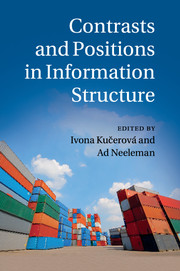Book contents
- Frontmatter
- Contents
- List of Contributors
- 1 Introduction
- Part I The architecture of grammar and the primitives of information structure
- Part II Exploring the interfaces: case studies
- 8 NP ellipsis without focus movement/projections: the role of Classifiers
- 9 Focus in Greek wh-questions
- 10 Against FocusP: arguments from Zulu
- 11 Scrambling as formal movement
- 12 Left-peripheral arguments and discourse interface strategies in Yucatec Maya
- Bibliography
- Index
- References
8 - NP ellipsis without focus movement/projections: the role of Classifiers
from Part II - Exploring the interfaces: case studies
Published online by Cambridge University Press: 05 August 2012
- Frontmatter
- Contents
- List of Contributors
- 1 Introduction
- Part I The architecture of grammar and the primitives of information structure
- Part II Exploring the interfaces: case studies
- 8 NP ellipsis without focus movement/projections: the role of Classifiers
- 9 Focus in Greek wh-questions
- 10 Against FocusP: arguments from Zulu
- 11 Scrambling as formal movement
- 12 Left-peripheral arguments and discourse interface strategies in Yucatec Maya
- Bibliography
- Index
- References
Summary
Introduction
Ellipsis has often been argued to be closely related to concepts generally ascribed to the domain of information structure, notably the notion of Focus. An isomorphic mapping is assumed to exist between the interpretation of the focused element in ellipsis and syntactic positions licensing the ellipsis site. This is reflected in the literature on Noun Phrase Ellipsis (NP Ellipsis), in which focus is among the licensing mechanisms suggested to account for the derivation of ellipsis. In these focus-based analyses of (NP) ellipsis (as in, e.g., Corver and van Koppen unpub. ms., Eguren 2010 and Ntelitheos 2004), information-structural positions have been proposed to be an integral part of the syntactic structure. The focus approach to NP Ellipsis, employing specific focus projections, thus differs substantially from previous approaches to NP Ellipsis, in which the licensors were taken to be (i) agreement (Lobeck 1995, Kester 1996, among others), or – related to agreement – (ii) word-markers (e.g. Bernstein 1993), in the domain of morphosyntax; or, in a rather semantic approach, the licensor was taken to be (iii) partitivity (Sleeman 1996, among others).
In this chapter we provide arguments against accounts of ellipsis in terms of focus, drawing on evidence from NP Ellipsis. We put forward an analysis in which the derivation of ellipsis does not rely on a designated information-structural projection in the syntax. Instead, we propose that NP Ellipsis in a number of languages is licensed by the presence of a classifier phrase in the nominal structure – see Borer (2005). We show that discourse-related concepts such as focus are not relevant for ellipsis. We argue that focus, if present at all, arises as a by-product of the ellipsis licensing process and is not the primary licensing factor. This conclusion is drawn on the basis of our claim that the classifier phrase in ellipsis encodes the concept of partitivity (following Sleeman 1996). The proposed analysis thus casts doubts on the assumption that information-structural positions are required in the syntax, and encourages an approach in which the pragmatic interpretation of the phenomenon under discussion is not tied to a specific syntactic position.
- Type
- Chapter
- Information
- Contrasts and Positions in Information Structure , pp. 177 - 205Publisher: Cambridge University PressPrint publication year: 2012
References
- 11
- Cited by



